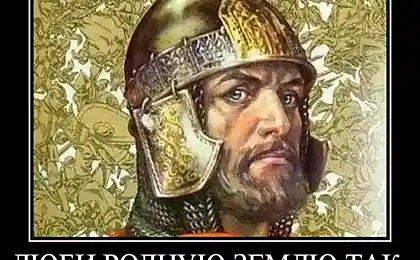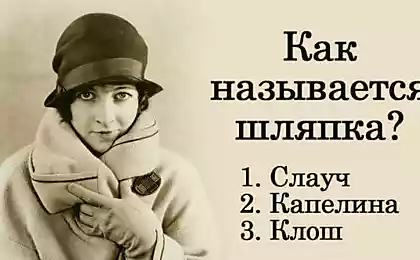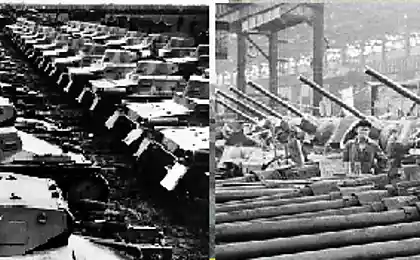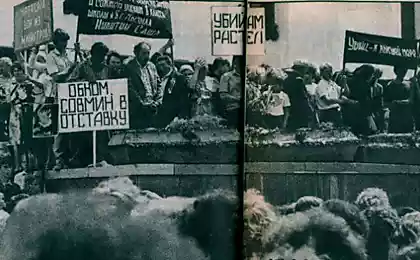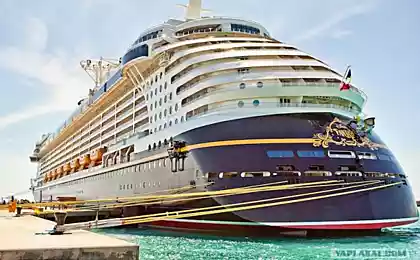775
Battle on the Ice
In our history - as, indeed, any other - the country there are events that are perceived by most people as the key to a proper understanding of its past. Among these, of course, belongs to the Ice - a victory over Alexander Nevsky The knights on Lake Peipsi April 5, 1242.
By the time the expansion of the West Russia have not yet had time to recover after the Mongol invasion. Many Russian princes began to attempt to form an alliance against the Mongols to the Catholic rulers of neighboring countries. The price of such a union with the Roman Catholic Europe was the recognition of the primacy of the pope. Many princes began to seriously consider the possibility. This greatly contributed to the fact that the spiritual guidance were actually destroyed, as in 1204 the Crusaders took Constantinople (the center of Orthodoxy), which led eventually to a complete surrender Patriarchate of Constantinople to the pope and the Byzantine Empire as a state temporarily ceased existence.
Against this background stands out the behavior of Alexander Yaroslavich. It not only seeks the help of powerful rulers and the Catholic bishops, but also quite strongly rejects any cooperation was "latynyanami" when they offer it. Ambassadors from Rome told the prince: "Dad tacos nash says: Slyshahom thee prince honest and a wonder, and thy land shall be great. Wherefore prislahom to Tobe from dvoyunadesyat kordinalu two hytretsa - Agaldada and Gemonta yes poslushaeshi ih doctrine of the law of God. '" Communicate with Pope Alexander did not want to, saying: "From you do not accept the teachings." In the context of the terrible trials that befell the Orthodox lands in the first half of the XIII century, Alexander - perhaps the only one of the secular rulers - no doubt the rightness of his spiritual, not pokolzanimalsya love their faith, without departing from their God. Rejecting the joint action with the Catholics against the Horde, he suddenly becomes the last stronghold of the powerful Orthodox Church, the last defender of the Orthodox world.
The western border of Russia to the middle of the XIII century
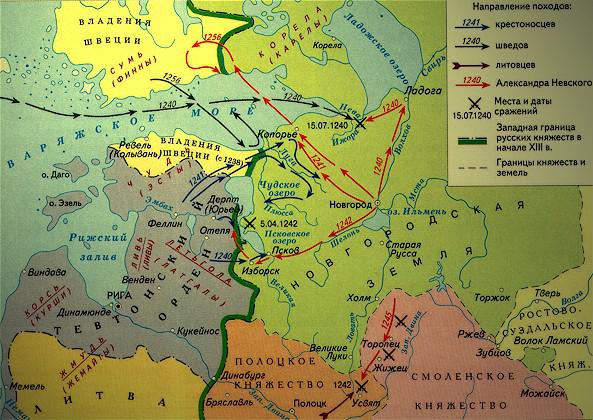
Dad decided to use force to subdue Russia. The first attempt was made by the Swedes on the Neva River in 1240, ended in complete failure. Two years later, he moved to Russia the best knights of the Livonian Order. Pope Gregory IX blessed by the Teutonic Knights in the Russian conquest of the indigenous lands. For greater legitimacy of their conquests was given the status of "Crusade". The purpose of the crusades to Russia was not just its political subordination, and the total conquest of the principalities, their destruction and capture of Russian lands, which never required the Mongols.
Army Alexander Nevsky
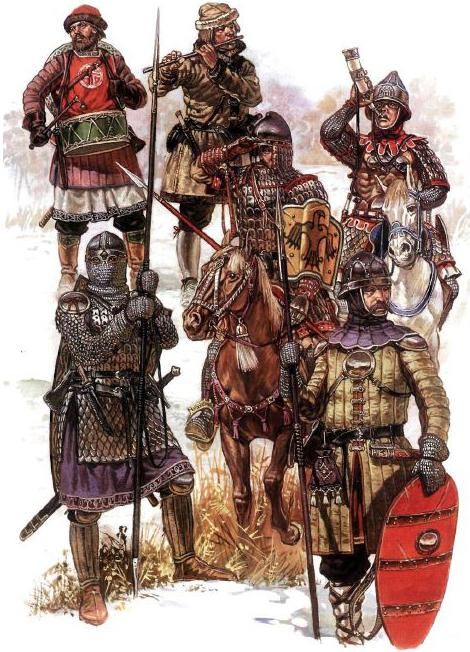
Army Livonian Order
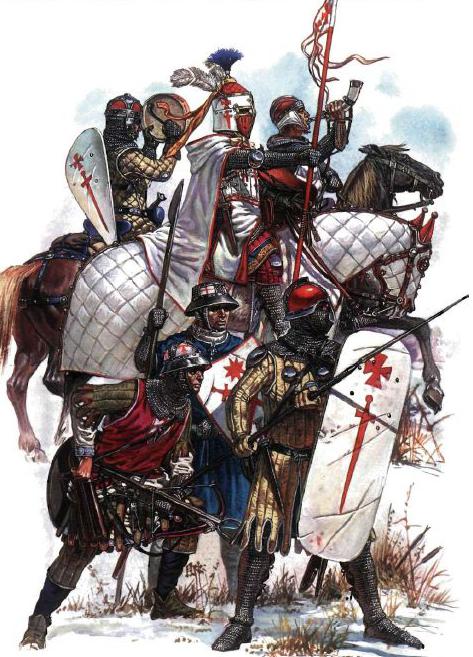
The war began with a hike of Bishop Herman, Master of the Teutonic Order and its allies in Russia. According to "rhymed chronicle" in the capture of Izborsk "any Russian did not let get away unscathed," "in the land began around great lamentation." Pskov was captured without a fight, the troops returned. Arriving in Novgorod in 1241, Alexander found Koporje Pskov and in the hands of the Order, and immediately began to react. Alexander Nevsky spoke at Koporye, took it by storm and killed most of the garrison. Some knights and mercenaries from the local population was captured, but released and traitors among Tschudi executed.
By the beginning of 1242, Alexander waited for his brother Andrew Yaroslavich with "grassroots" forces Suzdal. When the "bottom" of the battle was still on the way, Alexander the Novgorod forces acted under the Pskov. The city was surrounded by them. The Order did not have time to quickly gather and send reinforcements to the besieged. Pskov was taken, the garrison interrupted and medal governors (2 brother-knight) in chains were sent to Novgorod.
All these events took place in March 1242. Knights were only able to concentrate their forces in the Bishopric of Dorpat. Novgorod beat them at the time. Alexander then led the troops in Izborsk, his intelligence crossed the border of the Order. One of the intelligence units in the collision with the Germans had been defeated, but in general, Alexander was able to determine that the knights of the main forces moved far to the north, in the junction between Pskov and Lake Peipsi. Thus, they went a short way to Novgorod and cut off the Russian troops in the region of Pskov.
The opposing armies met the morning of April 5, 1242. According to various reports chronicle is possible to believe that the army of German knights was 10-12 thousand, and the Novgorod army -15-17 thousand. At dawn, the Knights built a "wedge" or "pig." The chain mail and helmets, with long swords, they seemed invulnerable. Alexander built an army of Novgorod, on the order of battle is unknown. It is believed that it was "polchny number" with the guard in front of the regiment. Judging by the chronicles miniatures, the order of battle facing the rear of the steep steep eastern shore of the lake, and the best squad to ambush Alexander hid behind one of the wings. The selected position has been beneficial in that the Germans were advancing on the open ice, were unable to determine the location, size and composition of Russian ratification Sticking long spears, the Germans attacked the center ("forehead") order of battle Russian. "That is the banner brothers infiltrated shooters guard regiment. - It could be heard ringing swords, and it was seen as helmets were cut from both sides fell dead. " About breakout enemy Novgorod regiments Russian chronicler wrote: "The Germans and chyud probishasya pigs through the shelf." However, stumbled on the steep bank of the lake, slow-moving, encased in armor knights could not build on their success. On the contrary, the knightly cavalry boring, as the rear ranks pushed the front ranks of the Knights, who had nowhere to turn for a fight.
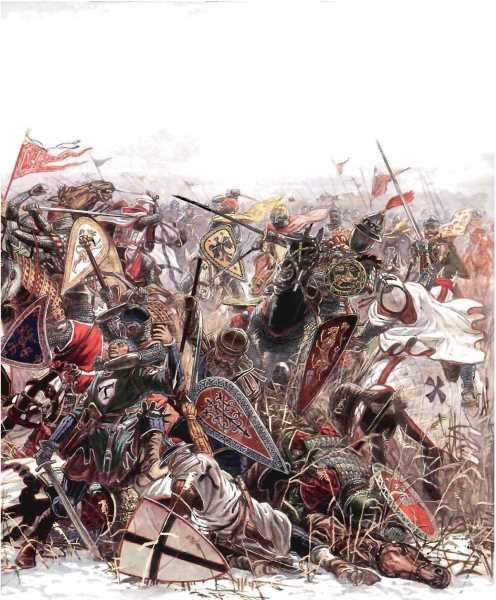
-
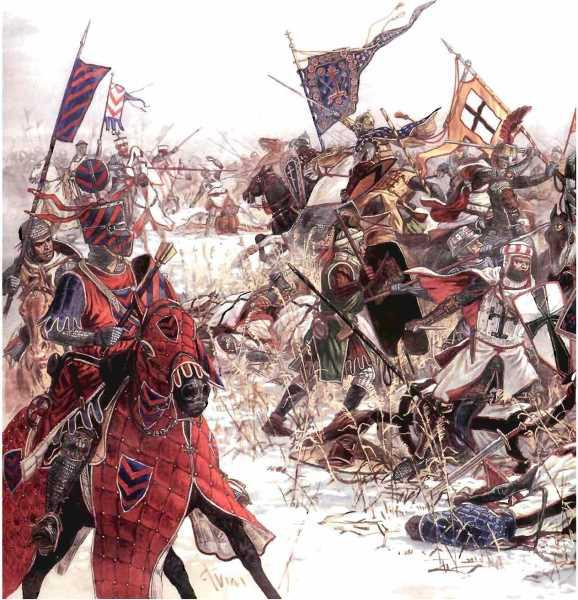
The wings were the Russian order of battle ("wings") did not allow the Germans to develop the success of the operation. German "wedge" was trapped in a pincer movement. At this time, the squad Alexander struck from behind and completed the encirclement of the enemy. "The army was surrounded by brothers».
2nd and 3rd stages of the battle
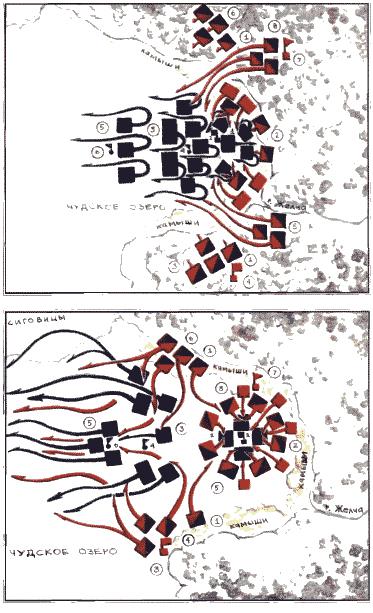
The soldiers, who had a spear with special hooks, dragged knights with horses; soldiers, armed with knives, "zasapozhnikami" disabling horses, after which the knights became easy prey. "And there was the slaughter of evil and the great German and chyudi and baa Truskov copies of refraction, and the sound of mechnago section, yakozhe lake pomerzshu dvignutis and not bevideti Ledoux, to cover Bo Xia blood." Ice brought down under the weight of a bunch of heavily armed knights began to crack. Some knights managed to break through the encirclement and they tried to escape, but many of them drowned.
Novgorodians chasing remnants fled in disarray knight's troops on the ice of Lake Peipus down to the opposite coast, seven miles away. Harassment remnants of the defeated enemy out of the fight was a new phenomenon in the development of Russian military art. Novgorod did not celebrate the victory "on kosteh", as was the custom before. He managed to save only those who were in the tail "pig" and has been on a horse: Master of the Order, Commander and bishops.
German knights suffered complete defeat. In the battle killed more than 500 knights and "countless" other troops captured 50 "deliberately governor," that is noble knights. They all followed the walking horses winners to Pskov.
In the summer of 1242 "medal brothers" were sent to Novgorod ambassadors with a bow, "esmya logged sword Pskov, Vod, Meadow, Latygolu and we are smiling to just step back and that esmya izoimali in full of people of your (POWs) and those smiling rozmenim, we let your, and our, you empty and full of empty Pskov. " Novgorod agreed to these terms, and the world was made.
"Battle on the Ice" was the first case in the history of the art of war, when the heavy knightly cavalry was defeated in a field battle troops, consisting for the most part of the infantry. Russian order of battle ("polchny number" in the presence of a reserve) turned out to be flexible as a result succeeded in surroundings enemy order of battle which was a lot of sedentary; Infantry interact successfully with his cavalry.
The victory over the army of the German feudal lords had great political and military-strategic importance, delaying their advance to the East - Drang nach Osten, - which has been the leitmotif of German policy from 1201 to 1241. North-western border of the Novgorod land was safely secured in time for the time when the Mongols were returning from a trip to Central Europe. Later, when Batu returned to Eastern Europe, Alexander showed the necessary flexibility and has agreed with the establishment of peaceful relations, eliminating any opportunity for new invasions.
God is not in power but in truth !!!
Posted in [mergetime] 1301991814 [/ mergetime]
taken here
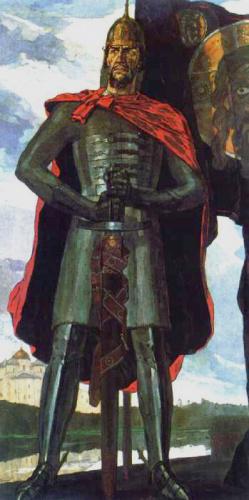
Source:
By the time the expansion of the West Russia have not yet had time to recover after the Mongol invasion. Many Russian princes began to attempt to form an alliance against the Mongols to the Catholic rulers of neighboring countries. The price of such a union with the Roman Catholic Europe was the recognition of the primacy of the pope. Many princes began to seriously consider the possibility. This greatly contributed to the fact that the spiritual guidance were actually destroyed, as in 1204 the Crusaders took Constantinople (the center of Orthodoxy), which led eventually to a complete surrender Patriarchate of Constantinople to the pope and the Byzantine Empire as a state temporarily ceased existence.
Against this background stands out the behavior of Alexander Yaroslavich. It not only seeks the help of powerful rulers and the Catholic bishops, but also quite strongly rejects any cooperation was "latynyanami" when they offer it. Ambassadors from Rome told the prince: "Dad tacos nash says: Slyshahom thee prince honest and a wonder, and thy land shall be great. Wherefore prislahom to Tobe from dvoyunadesyat kordinalu two hytretsa - Agaldada and Gemonta yes poslushaeshi ih doctrine of the law of God. '" Communicate with Pope Alexander did not want to, saying: "From you do not accept the teachings." In the context of the terrible trials that befell the Orthodox lands in the first half of the XIII century, Alexander - perhaps the only one of the secular rulers - no doubt the rightness of his spiritual, not pokolzanimalsya love their faith, without departing from their God. Rejecting the joint action with the Catholics against the Horde, he suddenly becomes the last stronghold of the powerful Orthodox Church, the last defender of the Orthodox world.
The western border of Russia to the middle of the XIII century

Dad decided to use force to subdue Russia. The first attempt was made by the Swedes on the Neva River in 1240, ended in complete failure. Two years later, he moved to Russia the best knights of the Livonian Order. Pope Gregory IX blessed by the Teutonic Knights in the Russian conquest of the indigenous lands. For greater legitimacy of their conquests was given the status of "Crusade". The purpose of the crusades to Russia was not just its political subordination, and the total conquest of the principalities, their destruction and capture of Russian lands, which never required the Mongols.
Army Alexander Nevsky

Army Livonian Order

The war began with a hike of Bishop Herman, Master of the Teutonic Order and its allies in Russia. According to "rhymed chronicle" in the capture of Izborsk "any Russian did not let get away unscathed," "in the land began around great lamentation." Pskov was captured without a fight, the troops returned. Arriving in Novgorod in 1241, Alexander found Koporje Pskov and in the hands of the Order, and immediately began to react. Alexander Nevsky spoke at Koporye, took it by storm and killed most of the garrison. Some knights and mercenaries from the local population was captured, but released and traitors among Tschudi executed.
By the beginning of 1242, Alexander waited for his brother Andrew Yaroslavich with "grassroots" forces Suzdal. When the "bottom" of the battle was still on the way, Alexander the Novgorod forces acted under the Pskov. The city was surrounded by them. The Order did not have time to quickly gather and send reinforcements to the besieged. Pskov was taken, the garrison interrupted and medal governors (2 brother-knight) in chains were sent to Novgorod.
All these events took place in March 1242. Knights were only able to concentrate their forces in the Bishopric of Dorpat. Novgorod beat them at the time. Alexander then led the troops in Izborsk, his intelligence crossed the border of the Order. One of the intelligence units in the collision with the Germans had been defeated, but in general, Alexander was able to determine that the knights of the main forces moved far to the north, in the junction between Pskov and Lake Peipsi. Thus, they went a short way to Novgorod and cut off the Russian troops in the region of Pskov.
The opposing armies met the morning of April 5, 1242. According to various reports chronicle is possible to believe that the army of German knights was 10-12 thousand, and the Novgorod army -15-17 thousand. At dawn, the Knights built a "wedge" or "pig." The chain mail and helmets, with long swords, they seemed invulnerable. Alexander built an army of Novgorod, on the order of battle is unknown. It is believed that it was "polchny number" with the guard in front of the regiment. Judging by the chronicles miniatures, the order of battle facing the rear of the steep steep eastern shore of the lake, and the best squad to ambush Alexander hid behind one of the wings. The selected position has been beneficial in that the Germans were advancing on the open ice, were unable to determine the location, size and composition of Russian ratification Sticking long spears, the Germans attacked the center ("forehead") order of battle Russian. "That is the banner brothers infiltrated shooters guard regiment. - It could be heard ringing swords, and it was seen as helmets were cut from both sides fell dead. " About breakout enemy Novgorod regiments Russian chronicler wrote: "The Germans and chyud probishasya pigs through the shelf." However, stumbled on the steep bank of the lake, slow-moving, encased in armor knights could not build on their success. On the contrary, the knightly cavalry boring, as the rear ranks pushed the front ranks of the Knights, who had nowhere to turn for a fight.

-

The wings were the Russian order of battle ("wings") did not allow the Germans to develop the success of the operation. German "wedge" was trapped in a pincer movement. At this time, the squad Alexander struck from behind and completed the encirclement of the enemy. "The army was surrounded by brothers».
2nd and 3rd stages of the battle

The soldiers, who had a spear with special hooks, dragged knights with horses; soldiers, armed with knives, "zasapozhnikami" disabling horses, after which the knights became easy prey. "And there was the slaughter of evil and the great German and chyudi and baa Truskov copies of refraction, and the sound of mechnago section, yakozhe lake pomerzshu dvignutis and not bevideti Ledoux, to cover Bo Xia blood." Ice brought down under the weight of a bunch of heavily armed knights began to crack. Some knights managed to break through the encirclement and they tried to escape, but many of them drowned.
Novgorodians chasing remnants fled in disarray knight's troops on the ice of Lake Peipus down to the opposite coast, seven miles away. Harassment remnants of the defeated enemy out of the fight was a new phenomenon in the development of Russian military art. Novgorod did not celebrate the victory "on kosteh", as was the custom before. He managed to save only those who were in the tail "pig" and has been on a horse: Master of the Order, Commander and bishops.
German knights suffered complete defeat. In the battle killed more than 500 knights and "countless" other troops captured 50 "deliberately governor," that is noble knights. They all followed the walking horses winners to Pskov.
In the summer of 1242 "medal brothers" were sent to Novgorod ambassadors with a bow, "esmya logged sword Pskov, Vod, Meadow, Latygolu and we are smiling to just step back and that esmya izoimali in full of people of your (POWs) and those smiling rozmenim, we let your, and our, you empty and full of empty Pskov. " Novgorod agreed to these terms, and the world was made.
"Battle on the Ice" was the first case in the history of the art of war, when the heavy knightly cavalry was defeated in a field battle troops, consisting for the most part of the infantry. Russian order of battle ("polchny number" in the presence of a reserve) turned out to be flexible as a result succeeded in surroundings enemy order of battle which was a lot of sedentary; Infantry interact successfully with his cavalry.
The victory over the army of the German feudal lords had great political and military-strategic importance, delaying their advance to the East - Drang nach Osten, - which has been the leitmotif of German policy from 1201 to 1241. North-western border of the Novgorod land was safely secured in time for the time when the Mongols were returning from a trip to Central Europe. Later, when Batu returned to Eastern Europe, Alexander showed the necessary flexibility and has agreed with the establishment of peaceful relations, eliminating any opportunity for new invasions.
God is not in power but in truth !!!
Posted in [mergetime] 1301991814 [/ mergetime]
taken here

Source:








